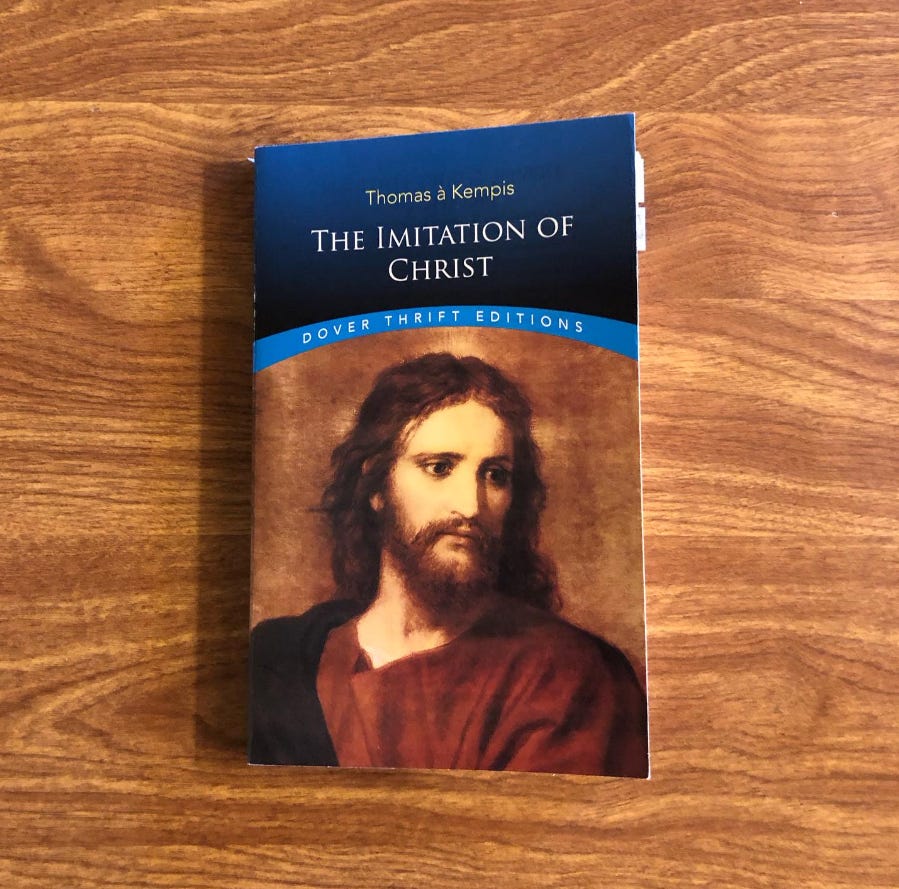The Imitation of Christ by Thomas Kempis
Kempis's classic spiritual guide provokes fruitful contemplation.
If I could sum up this book in one sentence, I would say:
Forgo the will of the self and embrace the will of God.
I believe that we are right to seek comfort in religion, more specifically in our Christianity, but this comfort is really a spiritual and not an earthly one that requires tremendous suffering and a constant battle against our inclination to sin, that is, our inclination to depart from the perfect, unchanging, and holy will of God.
The Imitation of Christ offers prayerful meditation on this idea of placing spiritual comfort above earthly comfort and recognizes with deeply introspective language the laborious task the spiritual life is at its core.
The book also extensively deals with representing God as a loving father who invites us to partake of him; that is, he wants us to be in communion with him and be restored to what we were created for. God is not an authoritarian and legalistic dictator—he genuinely wants us to learn to turn away from our own will to learn his perfect will. As Boethius and Pascal thought, sin makes one lesser.
Much of my initial reflections as I began to make my way through The IOC called to mind the lessons found in the book of Ecclesiastes, one of my favorite books in the Bible.
The conclusion that Ecclesiastes essentially offers is that all is vanity without God, but its author also rejoices in the fact that God created things as “good,” and it is necessarily not the love of something that is bad but the love of things more than God that is bad.
The IOC makes it very clear that worldly things do not satisfy us because they are temporal. Here, one of my favorite C.S. Lewis quotes comes to mind:
“If we find ourselves with a desire that nothing in this world can satisfy, the most probable explanation is that we were made for another world.” - C.S. Lewis
Regarding the warnings of the IOC against worldly knowledge, I recall Ecclesiastes 1:18: “For in much wisdom is much grief: and he that increaseth knowledge increaseth sorrow.”
I find this to be true in different ways. There is, of course, the old adage that the more knowledge we gain, the more we realize we don’t know, and this brings pain because it reminds us of our weaknesses and limitations. In another way, gaining more knowledge places more responsibility on us. However, I think the appropriate term for the latter idea is “awareness,” like how the conscious awareness of our own sin (here, I think of Adam and Eve after the Fall) makes us realize how we are helpless without God. This awareness places the weight of our exiled existence on us, and this realization can be painful. We then realize that we have a responsibility and accountability before God, who knows our hearts, and it may be painful to acknowledge this because we may have sins that we cling to, but we know deep down we need to change our behavior. True repentance is a change of heart, and genuine faith in Christ is a faith that moves. The leap of faith is a recognition that we can’t rely on ourselves:
“Trust in the Lord with all thine heart; and lean not unto thine own understanding. In all thy ways acknowledge him, and he shall direct thy paths” (Proverbs 3:5-6).
Returning to the point of knowledge bringing grief, not all knowledge is useful or productive. The IOC makes the point that the goal is not merely knowledge itself but knowledge that is true, knowledge that sets us free:
“For if the truth has made you free, then you shall be free indeed, and you shall not care for the vain words of men” (“We Must Walk Before God in Humility and Truth”).
Knowledge itself, like belief, does not mean one’s will is going to change. Even the demons believe (James 2:19). Thus, the true goal is not merely to possess true knowledge but to act on it. Correct behavior is shaped by knowledge of the truth, the love of the truth, and genuine faith. The heart and will have to be aligned: Regarding works born from true faith, The IOC remarks:
“If you consider well what you are within, you will not care what men say about you. They look to appearances but God looks to the heart. They consider the deed but God weighs the motive” (“The Joy of a Good Conscience”).
This is where resting in God roots us in the reason why we were created and places meaning in our suffering. We were created out of love to share in God’s perfect presence and abide in his unchanging will. The story of the Bible is the story of a God after the hearts of his children whom he loves.
We aren’t created for ourselves; we are created to serve God, and we do so by loving Him and loving others first, which are the two greatest commandments according to Christ (Matthew 22:37-39). We don’t love ourselves so we can love God and others; we love God and others so we can love ourselves. Loving God and loving others is what fulfills us because it is what we were created for. Heaven is a community, a “City of God,” as Augustine put it.
The IOC reminds us to sincerely ponder the person of Jesus Christ and approach everything with humility.
Any Christian will find this book edifying, and I think everyone in general can take away something from it.
Book citation:
Kempis, Thomas, et al. The Imitation of Christ. Dover Publications, 2003.




